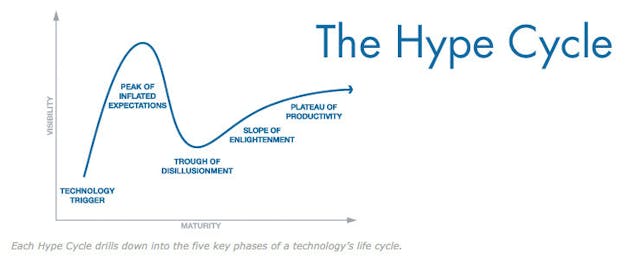Recent news suggests that we may be at the leading edge of the "trough of disillusionment" for the hype cycle that ushered in the MOOCs. The pushback on massively open online courses is not coming from the funders (who seem willing to keep betting that scale will lead to monetization) but from faculty.
From Amherst to San Jose State, faculty are asking about the wisdom of setting a price of zero for college teaching. How many news organizations wish they had a "do-over" of their initial decision to publish all their print content (from newspapers that people would pay to buy) free on the web?
Faculty are also wondering about the prudence of encouraging a teaching regime that relies on a few superstar teachers (the MOOC creators) and an army of facilitators (the people formerly known as the faculty).
The concerns of faculty certainly are valid; any counterweight to the MOOC "peak of inflated expectations" should be welcome. How else will higher ed and online education at scale get to the next steps in a classic evolution: the "slope of enlightenment," and finally, the "plateau of productivity"?
Saying that it is a good thing that faculty are worried about MOOCs, and arguing that faculty should be worried about MOOCs, are however, two different things.
Yes, faculty have cause to worry about their role in the higher education of the future. No, MOOCs are not what they should really be worried about.
If anything, the spread of MOOCs will be a positive development for all faculty, as MOOCs focus attention on teaching. The best thing about a MOOC is not what it does for the learners engaged in the course, or the faculty member teaching the class, but what the MOOC does (or should do) for every course on campus.
MOOCs, no matter how wonderful, will not be the mechanism that pays the higher ed bills. We need tuition-paying students. If students can get almost the same thing from a free (or very cheap) online course as they can receive on our campus (residential or virtual) then eventually they will no longer choose to enroll at our institutions. The reason that this will not happen is that MOOCs are one element spurring investment and innovation in higher education.
I believe that over the next few years we will see a shift towards investment in instruction. We--the faculty--will offer a better value proposition. Our classes will layer what we are learning from MOOC experiments to the far more important foundation layers of education: interactions between faculty and students, and the personal relationships built between educators and learners.
This renewed focus on what happens inside the classroom--a focus driven by competitive necessity rather than ideology--will benefit our teaching faculty. The faculty member is the key member of the teaching team. The value of faculty that are both passionate about teaching and who excel at it will increase. Faculty looking to improve their teaching will have access to more resources, from expanded centers for teaching and learning to learning designers and educational technologists. Technologies to support teaching and learning will continue to evolve and the resources devoted to "academic computing" (as opposed to administrative computing) will continue to expand.
So why should faculty be worried?
Faculty should be worried for the same reason that all of us who care about higher education should be worried:
They should worry about our systematic public disinvestment in higher education. They should worry that health care costs will swamp the ability of the states to fund post-secondary education. They should worry about a political system that seems incapable of making long-term investments in the competitiveness of our country, one blind to the necessity of investing in the future skills and productivity of tomorrow's workforce.
I suspect that we will look back on the MOOC story as a largely positive development in the history of higher education, and we will wonder why we didn't sound the alarm every time the proportion of higher education funded by public dollars slipped another notch.


